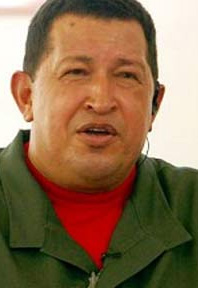CARACAS (Reuters) – Venezuelan President Hugo Chavez said yesterday doctors have found no more malignant cells in his body after cancer surgery but he delegated some powers just hours before a planned trip back to Cuba for chemotherapy.

Chavez resisted calls from the opposition to temporarily hand over the presidency of the OPEC-member South American nation to Vice President Elias Jaua during his absence. Instead, he gave Jaua and Finance Minister Jorge Giordani powers that include budgetary matters.
Chavez, 56, has said he had a large tumour removed last month in Cuba and was set to return to the Caribbean island yesterday for chemotherapy. He has not said what type of cancer he has or for how long he will be out of the country.
“I should say that after the extraction of the tumour and all the studies that we have been doing rigorously until today … no other malignant cell has been detected in my body,” Chavez said.
Chavez’s comment would indicate that his cancer has not become metastatic — spread to other parts of the body — and thus more dangerous and difficult to treat.
Chemotherapy refers to medical treatment using drugs intended to destroy cancer cells.
A source close to Chavez’s medical team in Venezuela has told Reuters he is suffering from colon cancer that needs delicate treatment. But the government has not confirmed the type of cancer.
Chavez, who calls Cuba’s Fidel Castro his mentor, has polarized politics in the Western Hemisphere since taking office in 1999 with his frequent lambasting of the United States, aggressive takeovers in Venezuela’s vital oil sector and nationalizations of large swathes of its economy. “I am going to delegate some decisions that until now were mine, signatures and decisions, to Vice President Elias Jaua and Jorge Giordani,” Chavez said during a televised cabinet meeting.
He mentioned some budgetary decisions and expropriations among the the powers he was delegating. Chavez’s socialist government makes widespread use of nationalizations and expropriations to redistribute wealth.
Opponents say it is impossible for Chavez to effectively govern the oil-producing nation of 29 million people from a Cuban hospital bed. The president resisted calls to step aside, however, since they echo a power vacuum during a short-lived coup against him back in 2002.
Chavez had two operations he described as “complicated” in Cuba last month — the first for a pelvic abscess and another to remove a large tumor. He was away almost a month until returning to Caracas on July 4 a day before Venezuela’s 200th independence celebration.
He had been warming up for a bid for another six-year term next year when the illness struck.
He is still the only declared candidate for the election but questions inevitably will be asked about his fitness to run in light of his illness. At the very least, his campaign will be shorter and more subdued than he would like. At worst, he may be forced to drop out.




